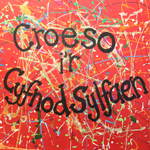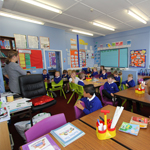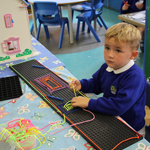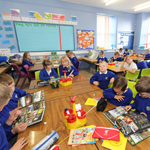Foundation Phase
Sarn Bach Primary School

The curriculum followed by children of Nursery age to Year 2 is called the Foundation Phase. In the Foundation Phase, the focus is on providing opportunities for pupils to develop their skills by encouraging structured play activities that are woven into the learning experiences.
Click here to see photos of Foundation Phase activities
The Foundation Phase is built around Seven Areas of Learning:
- Personal and Social Development, Well-Being and Cultural Diversity
- Language, Literacy and Communication Skills
- Mathematical Development
- Welsh Language Development
- Creative Development
- Physical Development
- Knowledge and Understanding of the World
The Foundation Phase places great emphasis on developing children’s skills and understanding, personal, social, emotional, physical and intellectual well-being so as to develop the whole child. The children are encouraged to nurture self-esteem and self-confidence to experiment, investigate, learn new things and form new relationships with others, to encourage their development as individuals.
Personal and Social Development, Well-being and Cultural Diversity
This Area of Learning focuses on children learning about themselves, their relationships with other children and adults. They are encouraged to develop their self-esteem, their personal beliefs and moral values. The Foundation Phase supports the cultural identity of all children, to celebrate different cultures and help children recognize and gain a positive awareness of their own and other cultures. Children are supported in becoming confident, competent and independent thinkers and learners.
Foundation Phase pupils follow the Webster-Stratton and Dina School curriculum to promote the development of their emotional and social well-being. Weekly sessions are held.
Language, Literacy and Communication Skills
This Area of Learning focuses on children being immersed in language experiences and activities. Their skills develop through talking and listening, setting a firm foundation to develop reading and writing skills. Children refer to their intentions by asking questions, voicing/expressing opinions, reacting to situations and making choices through a variety of media. They are encouraged to listen and respond to others. They have opportunities to choose and use reading material, understand conventions of print and books and are given a wide range of opportunities to enjoy mark making and writing experience.
Mathematical Development
 This Area of Learning focuses on children developing their skills, knowledge and understanding of mathematics by solving problems. They use numbers in their daily activities and develop a range of flexible methods for working mentally with number, in order to solve problems from a variety of contexts, moving onto using methods when they are developmentally ready. They investigate the properties of shape and measurement, and sort, match, sequence and compare objects and create patterns. This Area of Learning focuses on children developing their skills, knowledge and understanding of mathematics by solving problems. They use numbers in their daily activities and develop a range of flexible methods for working mentally with number, in order to solve problems from a variety of contexts, moving onto using methods when they are developmentally ready. They investigate the properties of shape and measurement, and sort, match, sequence and compare objects and create patterns.
Creative Development
 This Area of Learning focuses on children developing their imagination and creativity through the curriculum. Their natural curiosity and disposition to learn is stimulated by everyday sensory experiences. Children engage in creative, imaginative and expressive activities in art, craft, design, music, dance and movement. This Area of Learning focuses on children developing their imagination and creativity through the curriculum. Their natural curiosity and disposition to learn is stimulated by everyday sensory experiences. Children engage in creative, imaginative and expressive activities in art, craft, design, music, dance and movement.
Physical Development
This Area of Learning focuses on children’s physical development. Enthusiasm and energy for movement is continually promoted through helping them to use their bodies effectively, by encouraging spatial awareness, balance, control and co-ordination and developing motor and manipulative skills. Children are encouraged to enjoy physical activity and their developing sense of identity is linked closely to their own self-image, self-esteem and confidence. Children are introduced to the concepts of health, hygiene and safety and the importance of diet, rest, sleep and exercise.
Knowledge and Understanding of the World
 This Area of Learning focuses on children experiencing the familiar world through enquiry, and through safe and systematic investigation of the indoor and outdoor environment. Children are given experiences that increase their curiosity about the world around them and to begin to understand past events, people and places, living things and the work people do. They learn to demonstrate care, responsibility, concern and respect for all living things and the environment. This Area of Learning focuses on children experiencing the familiar world through enquiry, and through safe and systematic investigation of the indoor and outdoor environment. Children are given experiences that increase their curiosity about the world around them and to begin to understand past events, people and places, living things and the work people do. They learn to demonstrate care, responsibility, concern and respect for all living things and the environment.
|
